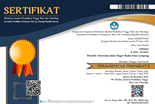Re-Aktivasi Instagram Sebagai Pemasaran Digital: Studi Kasus Psikologi Pemasaran UMKM BM
Abstract
Covid-19 is still endemic in all countries of the world and affects all sectors of people's lives, including Indonesia. In Indonesia, almost all sectors are affected, especially the economic ecosystem that has become the foundation of society. MSME is one of the activities that increase growth, movement, and economic development. Researchers are interested in exploring and examining the marketing methods carried out by BM SMEs. This study uses a descriptive qualitative method approach. The research informants this time were two people, the initials IS and AG. The IS informant is the owner of BM, while the AG informant is an employee of the marketing department. The data collection method used in this study was semi-structured interviews. The researcher uses a time triangulation technique which aims to cross-examine informants who know very well about BM. The results show that BM has Instagram social media but is not active. So that it is not optimal in doing marketing, especially in online marketing. Suggestions for business owners are to keep abreast of the times, such as optimizing the use of technology that is useful in developing a business. In addition, it also maintains and improves product quality so that it can compete with similar business people. Then suggestions for further researchers are to examine other factors in order to expand the scope of research.
Keywords: Instagram, marketing psychology, MSMEFull Text:
PDFReferences
Arianto, B. (2020). Pengembangan UMKM digital di masa pandemi Covid-19. Jurnal Administrasi Bisnis, 6(2), 233-247.
Azmi, F. D., & Pratiwi, T. (2021). Strategi pemasaran produk UMKM melalui penerapan digital marketing (Studi kasus pada Kelompok Usaha “Kremes Ubi” di Desa Cibunar, Kecamatan Rancakalong, Sumedang). Coopetition: Jurnal Ilmiah Manajemen, 12(1), 17-22.
Bagas, H. B., Palpiningdyah., & Slamet, A. (2019). Peran digital marketing sebagai upaya peningkatan omset penjualan bagi Klaster UMKM di Kota Semarang. Jurnal Pengabdian Masyarakat (ABDIMAS), 23(2), 117-120.
Bakhri, S., & Futiah, V. (2020). Pendampingan dan pengembangan manajemen pemasaran produk UMKM melalui teknologi digital di masa pandemi Covid-19. Jurnal Loyalitas Social, 2(2), 59-70.
Bargh, J. A. & McKenna, K. Y. A. (2004). The internet and social life. Annual Review of Psychology, (1), 573-590.
Bungin, B. (2008). Metode Penelitian Kuantitatif, Komunikasi, Ekonomi, dan kebijakan Publik serta Ilmu-ilmu sosial lainnya. Jakarta: Kencana Predana Media Group.
Chaffey, D., Chadwick, F. E., Mayer, R., & Johnston, K. (2009). Internet Marketing: Strategy, Implementation and Practice. Jakarta: Prentice Hall/Financial Times.
Darma, G. S. (2019). Kacamata Media, Kesuksesan Bersyarat. Indonesia: Pustaka Larasan Press.
Ferdiana, A. M. K., & Darma, G. S. (2019). Understanding fintech through Go-Pay. International Journal of Innovative Science and Research Technology, 4(2): 257-260.
Hardilawati, W. L. (2020). Strategi bertahan UMKM di tengah pandemi
Covid-19. Jurnal Akuntansi Dan Ekonomika, 10(1), 89–98.
Hasan, A. (2013). Marketing dan Kasus-Kasus Pilihan. Yogyakata: CAPS.
Jannatin, R., Wahyu, W. M., Haryanto, R., & Pebriyanto, A. (2020). Penerapan digital marketing sebagai strategi pemasaran UMKM. Jurnal Impact Implementation and Action, 2(2). 1-15.
Khan, F., & Siddiqui, K. (2013). The importance of Digital Marketing: An Exploratory Study to Find The Perception and Effectiveness of Digital Marketing amongst The Marketing Proffesionals in Pakistan. Journal of Information Sytems and Operations Management, 1-8.
Kurniawati, D., & Arifin, N. (2015). Strategi pemasaran melalui media sosial dan minat beli mahasiswa. JURNAL SIMBOLIKA: Research and Learning in Communication Study, 1(2).
Pranawa, I. P. L. A., & Abiyasa, A. P. (2019). Digital Marketing dan Hedonisme dalam Pengambilan Keputusan Pembelian. Jurnal Manajemen Bisnis, 16(4), 58.
Nafarin, M. (2009). Penganggaran Perusahaan. Jakarta: Salemba Empat.
Mamuaja, B. (2016). Analisis efektivitas penerapan sistem pengendalian intern terhadap kinerja instansi pemerintah di dinas pendapatan Kota Manado. Jurnal Riset Ekonomi, Manajemen, Bisnis Dan Akuntansi, 4(1).
Nugrahani, R. (2015). Peran desain grafis pada label dan kemasan produk makanan umkm. Jurnal Imajinasi, 9(2), 127–136.
Purwana, D., Rahmi, R., & Aditya, S. (2017). Pemanfaatan digital marketing bagi usaha mikro, kecil, dan menengah (UMKM) di Kelurahan Malaka Sari, Duren Sawit. Jurnal Pemberdayaan Masyarakat Madani, 1(1), 1–17.
Putra, I. G. N. A. P., & Darma, G. S. (2019). Is Bitcoin Accepted in Indonesia? , International Journal of Innovative Science and Research Technology, 4(2): 424-430.
Rachmawati, I. N. (2007). Pengumpulan data dalam penelitian kualitatif: wawancara. Jurnal Keperawatan Indonesia, 11(1), 35-40.
Rohmah, I. Y. (2021). Aspek psikologi dalam strategi marketing rekrutment jamaah haji dan umroh di PT Gaido Azza Darussalam Indonesia Cabang Kudus. Skripsi. IAIN Kudus.
Saufi, A., & Hermanto, M. (2021). Tracer study alumni magister manajemen fakultas ekonomi dan bisnis universitas mataram. Jurnal Magister Manajemen UNRAM, 10(1).
Sawicki, A. (2016). Digital Marketing. Journal World Scientific News, 48, 82-88.
Susilowati. (2017). Kegiatan Humas Indonesia Bergerak di Kantor Pos Depok II dalam Meningkatkan Citra Instansi Pada Publik Eksternal. Jurnal Komunikasi, 8(2).
Widyaningsih, T. S., Zamroni, Z., & Zuchdi, D. (2014). Internalisasi dan aktualisasi nilai-nilai karakter pada siswa SMP dalam perspektif fenomenologis. Jurnal Pembangunan Pendidikan: Fondasi dan Aplikasi, 2(2). 181-192.
Yudhaningsih, R. (2011). Peningkatan efektivitas kerja melalui komitmen, perubahan dan budaya organisasi. Jurnal Pengembangan Humaniora, 11(1), 40-50.
Yusanto, Y. (2020). Ragam Pendekatan Penelitian Kualitatif. Journal of Scientific Communication, 1(1), 1–13.
DOI: http://dx.doi.org/10.24042/ajp.v5i1.13988
Refbacks
- There are currently no refbacks.
Copyright (c) 2022 ANFUSINA: Journal of Psychology











